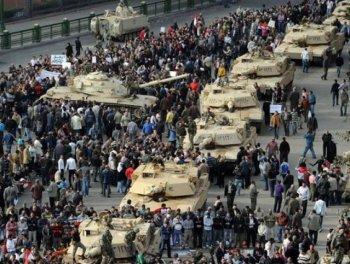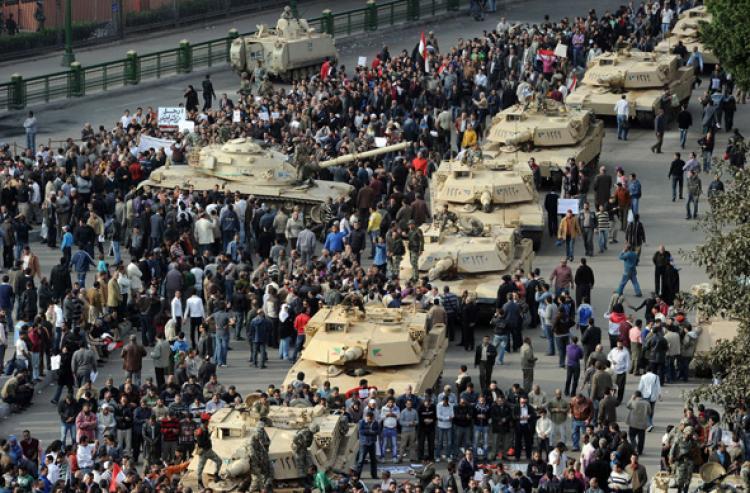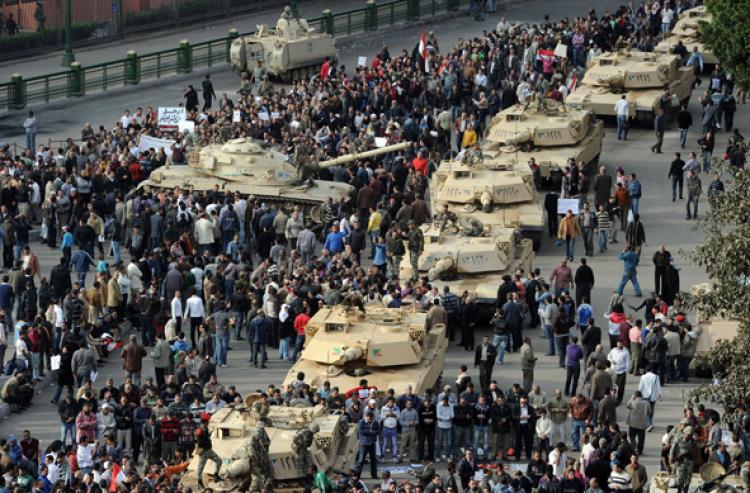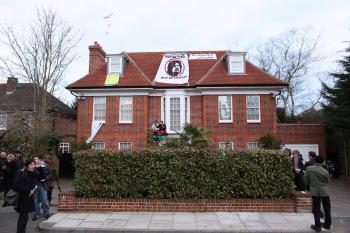Protesters continued to gather by the thousands in central Cairo on Sunday, defying the 4:00 p.m. start of curfew as prominent opposition leader Mohamed ElBaradei addressed the crowd offering himself as interim leader.
The day was full of tension as protesters ignored the earlier curfew, changed from 7:00 p.m. in the days prior, and the army presence swelled. More tanks were moved into the city center as military aircraft, at first jets and later helicopters, flew low overhead in a show of force against the mostly-student gathering at Tahrir Square.
In the evening ElBaradei, head of the National Association for Change (NAC) and potential candidate in the 2011 presidential election, spoke to the some 10,000 protesters, thereby negating rumors that he was under house arrest. The Nobel laureate said Egyptian history has entered a “new era” and the “regime’s departure” is required, according to local media organization Al-Masry Al-Youm.
ElBaradei, 68, arrived in the country from Vienna on Thursday. He appeared on television calling for a peaceful transition and offered to lead the people through it. “If [people] want me to lead the transition, I will not let them down,” the BBC quoted him saying.
ElBaradei, director general of the International Atomic Energy Agency (IAEA) from 1997 to 2009, won the Nobel Peace Prize along with the IAEA in 2005 for their efforts to limit nuclear weapons proliferation.
On Saturday, police and regular security forces were withdrawn from the streets of Cairo, leaving only the army. Minister of Defense and commander of the Egyptian Armed Forces was spotted with the protesters on Tahrir Square, Al-Masya Al-Youm reported.
So far, military leaders have said that they will not use force against demonstrators, but tension and uncertainty on the ground remain high with many students on the streets bracing for a possible crackdown.
Talk was circulating among young protesters all weekend, wondering if the situation will devolve into another Tiananmen Square-type incident, when Chinese authorities violently suppressed student-led pro-democracy demonstrations in June 1989.
Sources from inside Egypt report of looting in several areas across the country, prompting locals to organize vigilante groups in order to protect their property.
At the beginning of the anti-government protests, which started on Jan. 25, relations between police and protesters were more relaxed with both sides even sharing food and drinks.
Tensions escalated after some protesters threw rocks and Molotov cocktails at police and burned police vehicles, and police responded in kind.
However, a source within the police told The Epoch Times that he and others suspected the violence had been instigated by agitators among the otherwise peaceful student protesters.
The current protests against President Hosni Mubarak’s 30-year-rule have reached an unprecedented scale. Al Jazeera television puts the death toll from the protests at around 150 with another 4,000 injured. On Sunday, Egyptians donated urgently requested blood to hospitals in Cairo, replenishing depleted supplies.
Egyptian authorities ordered Al Jazeera to end its continuous reporting of the mass demonstrations in the country in an attempt to control the information getting out. Al Jazeera expressed its “utter disappointment” with the blockage signal on Nilesat from Al Jazeera on Sunday.
On the same day, prisons in Egypt were attacked and a few hundred Muslim militants and thousands of other inmates were freed, reported AP.
The United States continues to call on the Egyptian government to heed the demands of the protesters for reform.
According to Twitter messages posted Sunday by State Department spokesperson P.J. Crowley, Secretary of State Hillary Clinton said Egypt’s “government must open an inclusive national dialogue with the people of Egypt as part of a lengthy process of reform,” and that the “U.S. supports a peaceful, orderly transition to free, fair and credible elections that lead to real democracy in Egypt.”
Clinton confirmed in an interview Sunday with David Gregory of NBC’s “Meet The Press,” published on the State Department’s website, that no Americans have been injured in Egypt during the protests. However, the State Department issued a travel advisory against Egypt and has “authorized the voluntary departure of dependents and nonemergency employees from the country.
With reporting by Laila Hassan in Cairo.
The day was full of tension as protesters ignored the earlier curfew, changed from 7:00 p.m. in the days prior, and the army presence swelled. More tanks were moved into the city center as military aircraft, at first jets and later helicopters, flew low overhead in a show of force against the mostly-student gathering at Tahrir Square.
In the evening ElBaradei, head of the National Association for Change (NAC) and potential candidate in the 2011 presidential election, spoke to the some 10,000 protesters, thereby negating rumors that he was under house arrest. The Nobel laureate said Egyptian history has entered a “new era” and the “regime’s departure” is required, according to local media organization Al-Masry Al-Youm.
ElBaradei, 68, arrived in the country from Vienna on Thursday. He appeared on television calling for a peaceful transition and offered to lead the people through it. “If [people] want me to lead the transition, I will not let them down,” the BBC quoted him saying.
ElBaradei, director general of the International Atomic Energy Agency (IAEA) from 1997 to 2009, won the Nobel Peace Prize along with the IAEA in 2005 for their efforts to limit nuclear weapons proliferation.
On Saturday, police and regular security forces were withdrawn from the streets of Cairo, leaving only the army. Minister of Defense and commander of the Egyptian Armed Forces was spotted with the protesters on Tahrir Square, Al-Masya Al-Youm reported.
So far, military leaders have said that they will not use force against demonstrators, but tension and uncertainty on the ground remain high with many students on the streets bracing for a possible crackdown.
Talk was circulating among young protesters all weekend, wondering if the situation will devolve into another Tiananmen Square-type incident, when Chinese authorities violently suppressed student-led pro-democracy demonstrations in June 1989.
Sources from inside Egypt report of looting in several areas across the country, prompting locals to organize vigilante groups in order to protect their property.
At the beginning of the anti-government protests, which started on Jan. 25, relations between police and protesters were more relaxed with both sides even sharing food and drinks.
Tensions escalated after some protesters threw rocks and Molotov cocktails at police and burned police vehicles, and police responded in kind.
However, a source within the police told The Epoch Times that he and others suspected the violence had been instigated by agitators among the otherwise peaceful student protesters.
The current protests against President Hosni Mubarak’s 30-year-rule have reached an unprecedented scale. Al Jazeera television puts the death toll from the protests at around 150 with another 4,000 injured. On Sunday, Egyptians donated urgently requested blood to hospitals in Cairo, replenishing depleted supplies.
Egyptian authorities ordered Al Jazeera to end its continuous reporting of the mass demonstrations in the country in an attempt to control the information getting out. Al Jazeera expressed its “utter disappointment” with the blockage signal on Nilesat from Al Jazeera on Sunday.
On the same day, prisons in Egypt were attacked and a few hundred Muslim militants and thousands of other inmates were freed, reported AP.
The United States continues to call on the Egyptian government to heed the demands of the protesters for reform.
According to Twitter messages posted Sunday by State Department spokesperson P.J. Crowley, Secretary of State Hillary Clinton said Egypt’s “government must open an inclusive national dialogue with the people of Egypt as part of a lengthy process of reform,” and that the “U.S. supports a peaceful, orderly transition to free, fair and credible elections that lead to real democracy in Egypt.”
Clinton confirmed in an interview Sunday with David Gregory of NBC’s “Meet The Press,” published on the State Department’s website, that no Americans have been injured in Egypt during the protests. However, the State Department issued a travel advisory against Egypt and has “authorized the voluntary departure of dependents and nonemergency employees from the country.
With reporting by Laila Hassan in Cairo.




